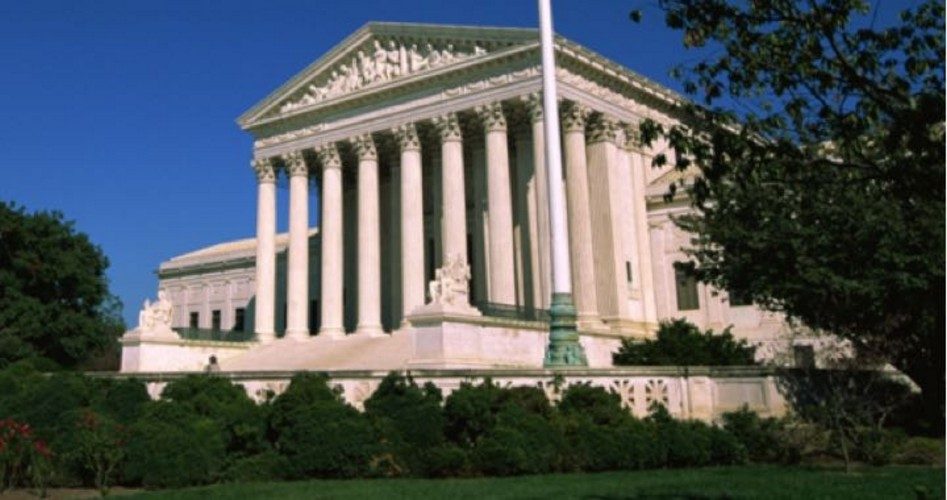
The U.S. Supreme Court, on the last day of the 2016-2017 term on June 26, granted most of the Trump administration’s emergency request to put the president’s March 6 travel ban executive order into place. That order places a 90-day ban on entry into the United States on citizens of Iran, Libya, Somalia, Sudan, Syria, and Yemen. The court will hear arguments related to the travel ban case during its next session, which will begin in October. The court also said it would partly allow a 120-day ban on all refugees entering the United States to go into effect.
The High Court, in an unsigned opinion, exempted one category of foreigners from the travel ban, those “with a credible claim of a bona fide relationship with a person or entity in the United States.”
Having a bona fide relationship means that the individuals have family members who reside in or have business ties with the United States.
The cases under consideration by the court on June 26 were Trump. v. International Refugee Assistance Project — considering the administration’s application for stay and appeal for writ of certiorari to the U.S. Court of Appeals for the Fourth Circuit, which was combined with Trump v. Hawaii, in which the administration sought a stay and appeal of a ruling by the States Court of Appeals for the Ninth Circuit. (A writ of certiorari is a document that a losing party in a court decision files with the Supreme Court asking the High Court to review the decision of a lower court.)
The Supreme Court wrote that these cases involve challenges to Executive Order No. 13780, Protecting the Nation From Foreign Terrorist Entry Into the United States. The High Court wrote: “The Government filed separate petitions for certiorari, as well as applications to stay the preliminary injunctions entered by the lower courts. We grant the petitions for certiorari and grant the stay applications in part.”
In another significant ruling during it busy last day of the term, in the case of Trinity Lutheran Church of Columbia, Inc. v. Comer, Director, Missouri Department of Natural Resources, the High Court ruled in favor of a Missouri church that had applied for a grant from the Department of Natural Resources to help renovate their preschool’s playground. The state rejected the church’s application, citing a strict policy against funding programs controlled by a religious entity. But the Supreme Court ruled 7-2 against the state, writing that it may not deny the church a public benefit because of its religious status.
“This Court has repeatedly confirmed that denying a generally available benefit solely on account of religious identity imposes a penalty on the free exercise of religion,” Chief Justice John Roberts wrote in the majority decision.
In another significant case, Masterpiece Cakeshop, Ltd. v. Colorado Civil Rights Commission, the High Court announced that it will hear the case of a Colorado baker who refused to bake a wedding cake for a same-sex couple because to do so would violate his religious principles. The baker, Jack Phillips, owner of Masterpiece Cakeshop, had refused to sell a customized cake for the couple’s “marriage,” claiming a religious exemption to the state’s anti-discrimination law. In response, the couple, Charlie Craig and David Mullins filed a complaint against Phillips and his suburban Denver bakery.
Oral arguments in the case will likely be held during the court’s term beginning in the fall.
In another case related to the right to keep and bear arms, the Supreme Court left in place a ruling from the Ninth Circuit Court of Appeals that upheld the San Diego sheriff’s strict limits on issuing permits for concealed weapons. Defenders of the Second Amendment contended that most law-abiding gun owners in San Diego, Los Angeles, and the San Francisco Bay area are being wrongly denied permits to carry a weapon when they leave home.
The circuit court has ruled last year that the “2nd Amendment does not preserve or protect a right of a member of the general public to carry concealed firearms in public.”
In dissent, Justices Clarence Thomas and Neil Gorsuch said the court should have reviewed the appellate ruling. Thomas said the decision not to hear the case “reflects a distressing trend: the treatment of the Second Amendment as a disfavored right.”
Photo of the Supreme Court: Clipart.com
Related articles:
Ninth Circuit Court Rules Against Travel Ban, but Trump Fires Back
Trump Administration Asks SCOTUS to Rule on “Travel Ban”
Trump’s DOJ Submitted “Watered Down” Version of His Travel Ban to Supreme Court
9th Circuit Court Considers Appeal of Judge’s Order Against Trump Travel Ban
Federal Judge Upholds Trump Travel Ban Blocked by Other Courts



